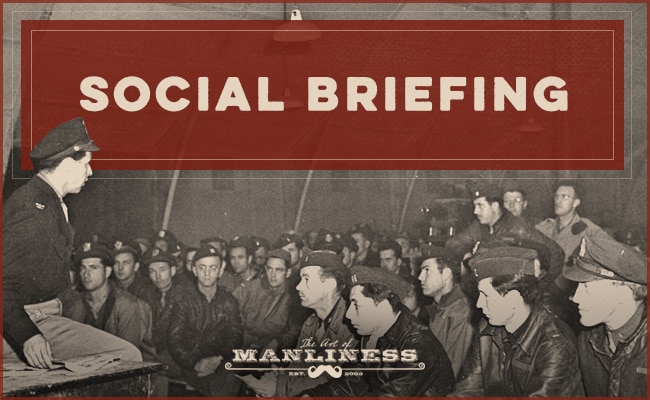In the two-way dance of social interactions, there’s plenty you can do to act smoothly yourself — from smiling and giving good eye contact, to asking good questions and demonstrating genuine interest.
But there are also ways to make things as easy as possible for the other person to execute their end of the exchange. Instead of making them feel awkward and really sweat to get to know you, you facilitate their social prowess. This not only enhances their “performance,” but makes the mutual interaction more enjoyable and successful for the both of you.
Here’s how to give a new acquaintance a helping hand:
Wear a Conversation Piece
One of things people struggle with most, is simply initiating conversation in the first place. They don’t know what to say to break the ice.
You can make it easier for folks to approach you by wearing something that easily elicits a compliment or question. Not something cheesy or kitschy – while people may notice an outright novelty item and ask you about it, they’ll have already formed an impression of you as a bit of a clown. Rather, display something like a watch, tie, or lapel pin that’s subtly different or interesting, or a t-shirt emblazoned with a band, team, or place someone may also have an affinity for or want to know more about (“Pray tell, what is ‘The Art of Manliness’?”). From experience, I can also say that having a mustache is a can’t-miss conversation starter.
Make Your Name Easy to Remember
Exchanging names is typically Act I in meeting someone new. Yet we all know from experience how easy it is to forget someone’s name literally 10 seconds after they say it. Once this happens to someone, the realization will nag at the back of their mind, distracting them from the conversation. They will also be more hesitant to say your name again and will feel less confident about interacting the next time they run into you.
It’s so easy to forget a name because the stress of small talk blocks it from being absorbed. The following tips work against this phenomenon, and can help your new acquaintance more readily remember your name:
Say it clearly. This seems like common sense, but when you tell others your name, do they often respond with “Huh?” or “What’s that?” If so, you need to articulate better (watch the mumbling), and maybe slow down some. If you’re in a noisy place, make sure you say your name with sufficient volume.
If your name is foreign or unusual, you’ll want to say it even more slowly and deliberately. Communication expert Carol Fleming recommends prefacing your offering of it with “My name is quite difficult for most people.” Since “you’ve warned them about your name, they’ll put extra effort into listening to it.”
If your name rhymes with something, pairing it with that can help too. “My name is Gower, which rhymes with tower.”
Say “My name is . . .” rather than “I’m . . .”. Fleming recommends the former phrasing because it “gives the additional information that a name is coming, so the other person can be ready to receive it. The latter could go in any direction: I’m leaving now, I’m glad to meet you, I’m excited about the food, and so on.”
Add something about yourself. Part of the reason names are hard for people to remember is that they don’t yet have context to situate them in; there’s no mental scaffolding on which to hang the identifier. Therefore, Fleming advises, whenever someone asks you what your name is, also offer something about yourself. For example:
- “My name is Sam Lewis. My family just moved here from Toledo and we’re looking for a new church to attend.”
- “My name is Jeff Jackson, and I was formerly in the accounting department but have been transferred here temporarily to work on the Acme Co. project.”
Adding a piece of information to your introduction not only makes your name more memorable, it also gives the other person something to ask you about (“What prompted the move?”), helping them continue the conversation.
Give Expansive, Specifics-Filled Answers to People’s Questions
Coming up with questions during conversation is a function of the information the other person shares. You tell me you’re from California, and I ask which part. You tell me you work in marketing, and I ask how you got into that field.
The less information you give when answering other people’s questions, therefore, the harder you make it for them to generate a good follow-up question, and the more likely it is that things will descend into awkward silence.
It would be nice if we lived in a world where everyone knew how to ask the kind of open-ended questions that elicit more expansive, information-filled answers, rather than close-ended questions that elicit just a single word reply, but alas, we do not.
Instead, chances are that a person you strike up a conversation with will primarily ask you the latter type: “Are you liking this class?” “Do you like to travel?” If you take the conversational bait and answer with a single word — “Yeah” — they’ll be lost as to what to ask you next.
So give people a helping hand by offering more expansive, detail-rich answers, even if they ask you a closed-ended question. Don’t prattle on, mind you, but move beyond “Yes” or “No” to offer a full sentence or two. And pepper your responses with specifics on names, places, etc., as generalities give the other person little to latch onto.
- “Yeah, this class has been great. I was a history major, but taking Philosophy 101 convinced me to switch and I’m really glad I did.”
- “Yeah, I love traveling. I recently got back from a trip to Maine and had the best time.”
Hopefully, you’ve given them enough fodder to easily ask a follow-up question: “Who did you have for Philosophy 101?” “What part of Maine were you in? I used to go to sleepaway camp there every summer.”
Describe Your Job in Terms People Can Understand
Just as giving one-word answers throws a roadblock into the conversation, so does describing your job in a vague, confusing, or technical way. Asking what someone does is usually done very early in the conversation, and if the other person doesn’t know how to respond to your answer, the nascent exchange can grind to a halt.
For example, instead of just saying “I’m in finance” or explaining your job in venture capital with lots of insider buzz words, say: “I’m in the finance/investing world. I work for a venture capital firm that, instead of looking for “sexy” tech start-ups, finds family-owned companies in “boring” industries like HVAC or billboards and helps the company to expand or the owners to retire. I’m the one who looks for companies that might be the right fit for us to invest in or buy.”
When you explain your job, it helps to supply the answers to three questions: What do you do? For whom? And how? In conveying this information, the other person will understand more about your work, and will be able to more easily ask you follow-up questions about it — keeping the good vibes of your convo rolling.



